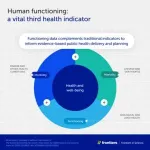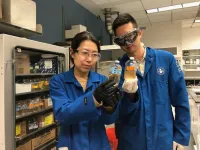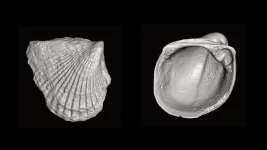(Press-News.org) The Covid pandemic shutdowns in South Asia greatly reduced the concentration of short-lived cooling particles in the air, while the concentration of long-lived greenhouse gases was barely affected. Researchers were thus able to see how reduced emissions of air pollution leads to cleaner air but also stronger climate warming.
It is well known that emissions of sulfur and nitrogen oxides and other air pollutants lead to the formation of aerosols (particles) in the air that can offset, or mask, the full climate warming caused by greenhouse gases such as carbon dioxide and methane. But there has been a lack of knowledge about this ‘masking effect’. In order to determine the size, large-scale experiments involving huge regions would be required – this is infeasible.
The Covid pandemic became such a ‘natural’ experiment. In the spring of 2020, the activity of many industries and transportation worldwide decreased due to pandemic restrictions. This created a unique opportunity to study what happens to the climate if emissions of gases and aerosols are rapidly reduced.
Measuring station in the northernmost Maldives
At Hanimaadhoo, a measuring station in the northernmost Maldives off the coast of India, researchers have been measuring the atmospheric composition and radiation for soon two decades. (Measurements reveal the impact of air pollution on climate and health in southern Asia) The measuring station is strategically placed to capture air masses from the Asian subcontinent and located in an area with few regional emission sources. When emissions suddenly decreased during the pandemic in South Asia (mainly Pakistan, India and Bangladesh), an opportunity was created to see what impact this had on the climate.
Short-lived air particles decreased but not greenhouse gases
A new article in the scientific journal NPJ Climate and Atmospheric Science shows that the concentrations of polluting short-lived air particles decreased significantly, while the concentrations of longer-lived greenhouse gases were barely affected in the air mass over South Asia. The cooling effect of the aerosols comes from the fact that they reflect incoming solar radiation back into space. With a lower aerosol content, there is less cooling, and thus less ‘masking’ of the warming effect of the significantly longer-lived climate gases. Measurements taken at the same time over the northern Indian Ocean revealed a seven percent increase in solar radiation reaching the Earth’s surface, thus increasing temperatures.
“Through this large-scale geophysical experiment, we were able to demonstrate that while the sky became bluer and the air cleaner, climate warming increased when these cooling air particles were removed,” says Professor Örjan Gustafsson at Stockholm University, who is responsible for the measurements in the Maldives and who led the study.
The results show that a complete phasing out of fossil fuel combustion in favor of renewable energy sources with zero emissions could result in rapid ‘unmasking’ of aerosols, while greenhouse gases linger.
“During a couple of decades, emission reductions risk leading to net climate warming due to the ‘masking’ effect of air particles, before the temperature reduction from reduced greenhouse gas emissions takes over. But despite an initial climate warming effect, we obviously still urgently need a powerful emission reduction,” says Örjan Gustafsson.
Contact:
Örjan Gustafsson, professor of biogeochemistry at Stockholm University
E-mail: orjan.gustafsson@aces.su.se Phone: 0046703247317
Read article in NPJ Climate and Atmospheric Science.
Additional reading: Measurements reveal the impact of air pollution on climate and health in southern Asia
END
Reduced emissions during the pandemic led to increased climate warming
2023-05-31
ELSE PRESS RELEASES FROM THIS DATE:
1 in 5 teachers feel carrying gun to class would make schools safer; More than half think armed teachers would make students less safe
2023-05-31
U.S. teachers are divided on whether arming themselves would make schools safer, with one in five saying they would be interested in carrying a gun to school, according to a nationally representative survey conducted by the RAND Corporation.
The survey found that 54% of teachers believe teachers carrying firearms would make schools less safe, 20% believe teacher-carry would make schools safer, and 26% feel it would make schools neither more nor less safe.
Yet even more concerning to teachers than guns is bullying, which teachers listed as their top safety concern.
The survey, conducted in October and November 2022, focused on how K-12 teachers view safety ...
Four ways to advance equity and justice goals in climate action planning
2023-05-31
Municipal climate action plans often identify equity and justice as goals, but engagement with these concepts is mostly rhetorical. A new study from the University of Waterloo details how planners can bridge the gap and challenge the current state of climate change and social inequity.
The study asserts that developing participatory approaches to public consultation and community engagement that actively and intentionally involve vulnerable populations who are most affected by climate change is critical. Expanding the sphere of knowledge we ...
Biological cleanup discovered for certain “forever chemicals”
2023-05-31
University of California, Riverside, chemical and environmental engineering scientists have identified two species of bacteria found in soil that break down a class of stubborn “forever chemicals,” giving hope for low-cost biological cleanup of industrial pollutants.
These bacteria destroy a subgroup of per- and poly-fluoroalkyl substances, or PFAS, that have one or more chlorine atoms within their chemical structure, Yujie Men, an assistant professor in the Bourns College of Engineering, and her UCR colleagues, reported in the journal Natural Water.
Unhealthful forever chemicals persist in the environment ...
Cancer survivors who quit smoking have 36% lower cardiovascular risk than continuers
2023-05-31
Sophia Antipolis, 31 May 2023: Cancer patients who continue smoking after their diagnosis have a nearly doubled risk of heart attack, stroke or death due to cardiovascular disease compared with non-smokers, according to research published on World No Tobacco Day in European Heart Journal, a journal of the European Society of Cardiology (ESC).1
According to the World Health Organization, there were more than 50.5 million cancer survivors worldwide in 2020.2 Study author Dr. Hyeok-Hee Lee of Yonsei University College ...
More depressed patients than previously estimated could have increased activation of their immune system
2023-05-31
New research from the Institute of Psychiatry, Psychology & Neuroscience (IoPPN) at King’s College London has used an assessment of gene expression involved in the immune response to show that there could be more patients with MDD with activated immune systems than research has previously estimated.
By identifying the molecular mechanisms involved in this association, the research could pave the way to better identify those patients with an immune component to their depression which would potentially help to provide more personalised approaches to treatment ...
Shedding light on the complex flow dynamics within the small intestine
2023-05-31
Science is well aware of the important role that gut bacteria and their interactions with the gastrointestinal tract play in our overall health. Villi, tiny finger-like structures that line the inside of the small intestine (SI), are known to interact with the gut bacteria and trigger a protective immune response. Despite researching into the molecular mechanisms underlying these interactions, however, not much is known about the dynamics of liquid flow around the villi.
While computer simulations have aided such observations, ...
UK cardiology societies issue joint policy statement to stamp out bullying, harassment, and discrimination in the specialty
2023-05-31
The British Junior Cardiologists’ Association (BJCA) and the British Cardiovascular Society (BCS) have issued a joint position statement in a bid to stamp out bullying, harassment, discrimination and other “unacceptable” and “unprofessional” behaviours in the specialty.
The statement, published online in the journal Heart, urges every cardiology team member to call out these behaviours to drive culture change.
Endorsed by 19 organisations affiliated with the BCS, the statement represents a specialty-wide response to the issue.
It comes in the wake of evidence suggesting ...
Predominance of young Asian men among large UK case series of laughing gas users
2023-05-31
The largest clinical case series to date of recreational users of nitrous oxide, popularly known as laughing gas, has found a predominance of young men of Asian ethnicity among those with neurological side effects who were seen at hospitals in 3 major cities in England.
This may indicate genetic susceptibility to the nerve damage caused by exposure to the gas, or other, as yet unidentified, social factors, suggest the researchers by way of an explanation for the finding, published online in the Journal of Neurology, Neurosurgery & Psychiatry.
Nitrous oxide is widely used as an anaesthetic in people and animals, ...
Ketamine nasal spray may prove safe and effective treatment for refractory migraine
2023-05-31
Ketamine taken in the form of a nasal spray may prove a safe and effective treatment for refractory chronic migraine, suggests a single centre study, published in the open access journal Regional Anesthesia & Pain Medicine.
It’s a more convenient alternative to intravenous infusion—the usual method of administration for these patients—but the potential for overuse means that it should be reserved for those in whom other treatment approaches have failed, caution the researchers.
Several clinical trials have shown ...
The clams that fell behind, and what they can tell us about evolution and extinction
2023-05-31
Every so often, life on Earth steps onto a nearly empty playing field and faces a spectacular opportunity. Something major changes—in the atmosphere or in the oceans, or in the organisms themselves —and the existing species begin to branch out into a brand-new world. Scientists are fascinated by this process, because it’s a unique look into evolution at pivotal moments in the history of life.
A new study led by scientists with the University of Chicago examined how bivalves—the group that includes clams, mussels, scallops, and oysters—evolved among many others in the period of rapid evolution known as the Cambrian Explosion. The team found ...





